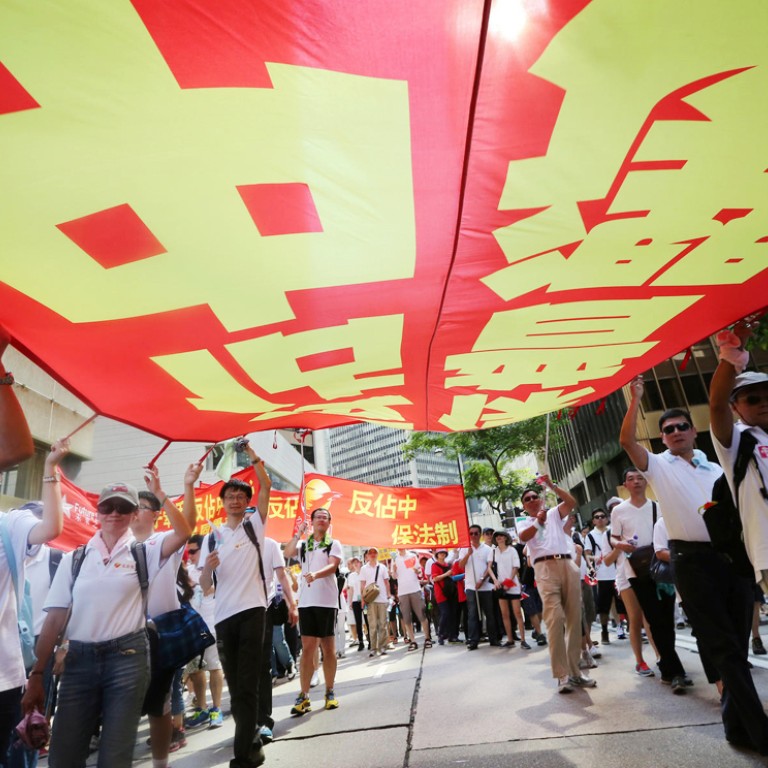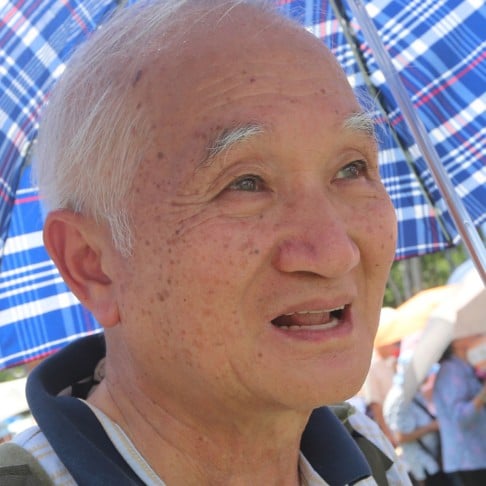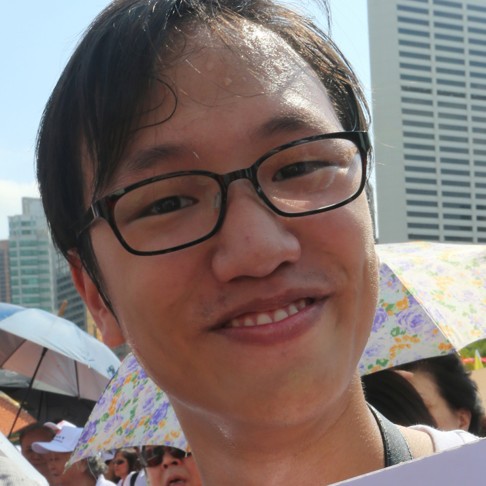
United they stand: Anti-Occupy campaign rallies establishment camp
Campaign has succeeded in rallying divided pro-establishment camp and expanded support base
Even before the march against the Occupy Central movement kicked off yesterday, the anti-Occupy campaign had achieved something Beijing has been unable to do so in recent years - rallying the divided pro-establishment camp and expanding its support base.

It also claimed to have collected more than 1.46 million signatures for the petition against the civil disobedience movement by Saturday, outnumbering the 793,000 who voted in Occupy Central's unofficial referendum on electoral reform in June. More than 1,500 organisations, including some business chambers, have signed the petition.
Some pro-establishment groups, which are at odds with the Leung Chun-ying administration, also come under the same banner to oppose the Occupy Central movement.
The Liberal Party, which backed former chief secretary Henry Tang Ying-yen's bid to challenge Leung in the 2012 chief executive election, is among the groups that actively mobilised supporters to take part in the anti-Occupy petition.
Leung's election in 2012 split the Beijing-loyalist camp and the chief executive has been struggling to win support from Beijing-friendly groups despite the central government's calls for unity. Liberal Party leader James Tien Pei-chun even suggested that Leung should perhaps consider resigning after the massive turnout for the July 1 march.
DON'T MISS: Tens of thousands take to the streets in anti-Occupy Central march
Organisers claimed 510,000 took part in that march, while police said the figure peaked at 98,600. A study commissioned by the estimated that 140,000 took part.
The anti-Occupy signature campaign started on July 19 and ended with yesterday's rally. The alliance, founded on July 3, set up at least 468 stations across the city to help collect signatures. It says it wants reform in a "peaceful and non-violent manner".
Occupy Central organisers plan to mobilise 10,000 supporters to block roads in the Central business district if the government does not offer a satisfactory reform plan for the chief executive election in 2017, the first such poll Beijing has said may be held under universal suffrage.
While some critics have raised questions about the massive number who signed the alliance petition, the people who signed it are not confined to supporters of pro-Beijing groups and pro-establishment organisations.
Tik Chi-yuen, a former Democratic Party lawmaker, said that on several occasions he had spent 30 minutes observing activity at different street stations.
"I noted many people walked to the stations, produced their identity cards to confirm their identities and signed the petition. They did it sincerely, hoping Hong Kong would not suffer from chaos and instability," Tik said. He knew supporters of pan-democrats who had signed.
Cheung Man-kwong, another former Democratic Party legislator, said some middle-class people had signed because they were fed up with the unruly behaviour of radical pan-democratic lawmakers during Legislative Council meetings and the recent mayhem caused by radical activists.
In June protesters used bamboo poles to try to force open doors to the Legco building when a crowd that had gathered to oppose government plans to build two new towns in northeastern New Territories grew angry. Police had to subdue the crowd with pepper spray.
Watch: Why Anti-Occupy Central demonstrators occupied Central, the answer is unclear
Cheung said the pro-establishment camp had successfully linked Occupy Central with violent protests, although the Occupy organisers have insisted their actions will be peaceful. "The Occupy Central movement offers the pro-establishment camp a golden opportunity to rally people from the pro-establishment camp and even expand its support base," Cheung said.
Tik, who is chief executive of the Evangelical Lutheran Church Social Service, said the confrontation between the Occupy Central movement and the anti-Occupy campaign had polarised the community.
"It's worrying that both pan-democratic and pro-establishment camps are engaging in the game of mobilising their respective supporters in an attempt to drown out each other," he said. "Frequent mobilisation of supporters from rival camps is not conducive to social harmony."
But alliance spokesman Robert Chow Yung said it did not make sense to expect people to sit back and do nothing when some wanted to achieve their goals through unlawful means.
"All we want is different political parties to negotiate for the best package for the 2017 election," he said.
The views from yhe street:

29, quantity surveyor
It is obvious that most people in Hong Kong want peace and universal suffrage and not something that will hold the city hostage. I don’t think it is right for people to use blackmail tactics. There should be a peaceful way to deal with it.

67, businessman
There was no choice but to come out [and protest] and I think it also helped that Chief Executive [Leung Chun-ying] came out to add his name to the campaign. We are worried that livelihoods will be impacted. We just want everyone to be able to make money and live in peace.

74, retired
Occupy Central will bring great destruction to Hong Kong and I don’t want to see that happen. Central is the hub of Hong Kong’s economy and they could really cause damage to people’s livelihoods.

76, retired
I signed the anti-Occupy petition very early on. Many people are actually outraged about [Occupy] but do not say it. If we don’t speak out now, then when?

13, Form One pupil
Occupy Central could bring traffic around Hong Kong to a standstill. I am worried people will not be able to get to work or to school.

26, administrative assistant
To be honest I don’t really have an opinion, although I tend to side with the anti-Occupy movement more. But I’m for anything that promotes a positive energy.

34, housewife
Even a protest like this can cause a lot of disruption to the city. Think about what Occupy Central could cause to all of society. All we want is to just get on with our lives and have peace.

21, student
I have opposed this sort of movement since Occupy Wall Street. Politics is not something that should be eye for an eye and there should be no threats involved. Each side can find a way to collect bargaining chips, and those with more will win.

21, mainland student
I was walking in Sogo and decided to come over and see what is going on. Personally, I am worried that Occupy Central could turn violent. This could affect Hong Kong’s reputation in the future.

43, housewife
I’m not too clear about what Occupy Central is about … but violence will not be good for Hong Kong, for families and for the next generation. I brought my son here from the mainland so he can see for himself what is going on.

